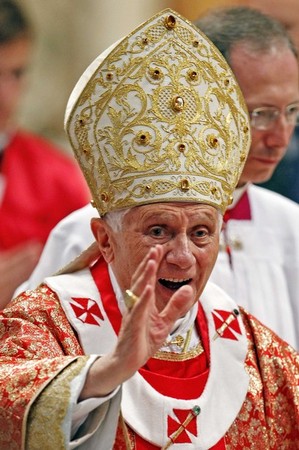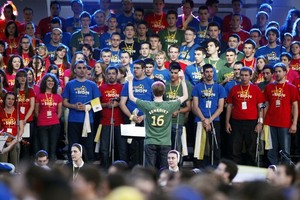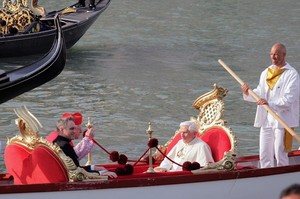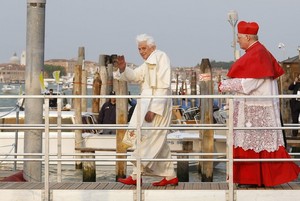Here’s Pope Benedict’s homily at the Mass in which he beatified Pope John Paul II today:
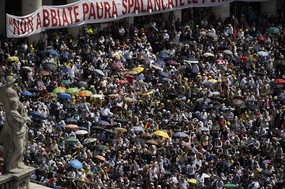
Six years ago we gathered in this Square to celebrate the funeral of Pope John Paul II. Our grief at his loss was deep, but even greater was our sense of an immense grace which embraced Rome and the whole world: a grace which was in some way the fruit of my beloved predecessor’s entire life, and especially of his witness in suffering. Even then we perceived the fragrance of his sanctity, and in any number of ways God’s People showed their veneration for him. For this reason, with all due respect for the Church’s canonical norms, I wanted his cause of beatification to move forward with reasonable haste. And now the longed-for day has come; it came quickly because this is what was pleasing to the Lord: John Paul II is blessed!
I would like to offer a cordial greeting to all of you who on this happy occasion have come in such great numbers to Rome from all over the world – cardinals, patriarchs of the Eastern Catholic Churches, brother bishops and priests, official delegations, ambassadors and civil authorities, consecrated men and women and lay faithful, and I extend that greeting to all those who join us by radio and television.

Today is the Second Sunday of Easter, which Blessed John Paul II entitled Divine Mercy Sunday. The date was chosen for today’s celebration because, in God’s providence, my predecessor died on the vigil of this feast. Today is also the first day of May, Mary’s month, and the liturgical memorial of Saint Joseph the Worker. All these elements serve to enrich our prayer, they help us in our pilgrimage through time and space; but in heaven a very different celebration is taking place among the angels and saints! Even so, God is but one, and one too is Christ the Lord, who like a bridge joins earth to heaven. At this moment we feel closer than ever, sharing as it were in the liturgy of heaven.
“Blessed are those who have not seen and yet have come to believe” (Jn 20:29). In today’s Gospel Jesus proclaims this beatitude: the beatitude of faith. For us, it is particularly striking because we are gathered to celebrate a beatification, but even more so because today the one proclaimed blessed is a Pope, a Successor of Peter, one who was called to confirm his brethren in the faith. John Paul II is blessed because of his faith, a strong, generous and apostolic faith. We think at once of another beatitude: “Blessed are you, Simon, son of Jonah! For flesh and blood has not revealed this to you, but my Father in heaven” (Mt 16:17). What did our heavenly Father reveal to Simon? That Jesus is the Christ, the Son of the living God. Because of this faith, Simon becomes Peter, the rock on which Jesus can build his Church. The eternal beatitude of John Paul II, which today the Church rejoices to proclaim, is wholly contained in these sayings of Jesus: “Blessed are you, Simon” and “Blessed are those who have not seen and yet have come to believe!” It is the beatitude of faith, which John Paul II also received as a gift from God the Father for the building up of Christ’s Church.
Our thoughts turn to yet another beatitude, one which appears in the Gospel before all others. It is the beatitude of the Virgin Mary, the Mother of the Redeemer. Mary, who had just conceived Jesus, was told by Saint Elizabeth: “Blessed is she who believed that there would be a fulfilment of what was spoken to her by the Lord” (Lk 1:45). The beatitude of faith has its model in Mary, and all of us rejoice that the beatification of John Paul II takes place on this first day of the month of Mary, beneath the maternal gaze of the one who by her faith sustained the faith of the Apostles and constantly sustains the faith of their successors, especially those called to occupy the Chair of Peter. Mary does not appear in the accounts of Christ’s resurrection, yet hers is, as it were, a continual, hidden presence: she is the Mother to whom Jesus entrusted each of his disciples and the entire community. In particular we can see how Saint John and Saint Luke record the powerful, maternal presence of Mary in the passages preceding those read in today’s Gospel and first reading. In the account of Jesus’ death, Mary appears at the foot of the cross (Jn 19:25), and at the beginning of the Acts of the Apostles she is seen in the midst of the disciples gathered in prayer in the Upper Room (Acts 1:14).
Today’s second reading also speaks to us of faith. Saint Peter himself, filled with spiritual enthusiasm, points out to the newly-baptized the reason for their hope and their joy. I like to think how in this passage, at the beginning of his First Letter, Peter does not use language of exhortation; instead, he states a fact. He writes: “you rejoice”, and he adds: “you love him; and even though you do not see him now, you believe in him and rejoice with an indescribable and glorious joy, for you are receiving the outcome of your faith, the salvation of your souls” (1 Pet 1:6, 8-9). All these verbs are in the indicative, because a new reality has come about in Christ’s resurrection, a reality to which faith opens the door. “This is the Lord’s doing”, says the Psalm (118:23), and “it is marvelous in our eyes”, the eyes of faith.

Dear brothers and sisters, today our eyes behold, in the full spiritual light of the risen Christ, the beloved and revered figure of John Paul II. Today his name is added to the host of those whom he proclaimed saints and blesseds during the al
most twenty-seven years of his pontificate, thereby forcefully emphasizing the universal vocation to the heights of the Christian life, to holiness, taught by the conciliar Constitution on the Church Lumen Gentium. All of us, as members of the people of God – bishops, priests, deacons, laity, men and women religious – are making our pilgrim way to the heavenly homeland where the Virgin Mary has preceded us, associated as she was in a unique and perfect way to the mystery of Christ and the Church. Karol Wojtyła took part in the Second Vatican Council, first as an auxiliary Bishop and then as Archbishop of Kraków. He was fully aware that the Council’s decision to devote the last chapter of its Constitution on the Church to Mary meant that the Mother of the Redeemer is held up as an image and model of holiness for every Christian and for the entire Church. This was the theological vision which Blessed John Paul II discovered as a young man and subsequently maintained and deepened throughout his life. A vision which is expressed in the scriptural image of the crucified Christ with Mary, his Mother, at his side. This icon from the Gospel of John (19:25-27) was taken up in the episcopal and later the papal coat-of-arms of Karol Wojtyla: a golden cross with the letter “M” on the lower right and the motto “Totus tuus”, drawn from the well-known words of Saint Louis Marie Grignion de Montfort in which Karol Wojtyla found a guiding light for his life: “Totus tuus ego sum et omnia mea tua sunt. Accipio te in mea omnia. Praebe mihi cor tuum, Maria – I belong entirely to you, and all that I have is yours. I take you for my all. O Mary, give me your heart” (Treatise on True Devotion to the Blessed Virgin, 266).

In his Testament, the new Blessed wrote: “When, on 16 October 1978, the Conclave of Cardinals chose John Paul II, the Primate of Poland, Cardinal Stefan Wyszynski, said to me: ‘The task of the new Pope will be to lead the Church into the Third Millennium.'” And the Pope added: “I would like once again to express my gratitude to the Holy Spirit for the great gift of the Second Vatican Council, to which, together with the whole Church – and especially with the whole episcopate – I feel indebted. I am convinced that it will long be granted to the new generations to draw from the treasures that this Council of the twentieth century has lavished upon us. As a Bishop who took part in the Council from the first to the last day, I desire to entrust this great patrimony to all who are and will be called in the future to put it into practice. For my part, I thank the Eternal Shepherd, who has enabled me to serve this very great cause in the course of all the years of my Pontificate”. And what is this “cause”? It is the same one that John Paul II presented during his first solemn Mass in Saint Peter’s Square in the unforgettable words: “Do not be afraid! Open, open wide the doors to Christ!” What the newly-elected Pope asked of everyone, he was himself the first to do: society, culture, political and economic systems he opened up to Christ, turning back with the strength of a titan – a strength which came to him from God – a tide which appeared irreversible. By his witness of faith, love and apostolic courage, accompanied by great human charisma, this exemplary son of Poland helped believers throughout the world not to be afraid to be called Christian, to belong to the Church, to speak of the Gospel. In a word: he helped us not to fear the truth, because truth is the guarantee of liberty. To put it even more succinctly: he gave us the strength to believe in Christ, because Christ is Redemptor hominis, the Redeemer of man. This was the theme of his first encyclical, and the thread which runs though all the others.

When Karol Wojtyla ascended to the throne of Peter, he brought with him a deep understanding of the difference between Marxism and Christianity, based on their respective visions of man. This was his message: man is the way of the Church, and Christ is the way of man. With this message, which is the great legacy of the Second Vatican Council and of its “helmsman”, the Servant of God Pope Paul VI, John Paul II led the People of God across the threshold of the Third Millennium, which thanks to Christ he was able to call “the threshold of hope”. Throughout the long journey of preparation for the great Jubilee he directed Christianity once again to the future, the future of God, which transcends history while nonetheless directly affecting it. He rightly reclaimed for Christianity that impulse of hope which had in some sense faltered before Marxism and the ideology of progress. He restored to Christianity its true face as a religion of hope, to be lived in history in an “Advent” spirit, in a personal and communitarian existence directed to Christ, the fullness of humanity and the fulfillment of all our longings for justice and peace.
Finally, on a more personal note, I would like to thank God for the gift of having worked for many years with Blessed Pope John Paul II. I had known him earlier and had esteemed him, but for twenty-three years, beginning in 1982 after he called me to Rome to be Prefect of the Congregation for the Doctrine of the Faith, I was at his side and came to revere him all the more. My own service was sustained by his spiritual depth and by the richness of his insights. His example of prayer continually impressed and edified me: he remained deeply united to God even amid the many demands of his ministry. Then too, there was his witness in suffering: the Lord gradually stripped him of everything, yet he remained ever a “rock”, as Christ desired. His profound humility, grounded in close union with Christ, enabled him to continue to lead the Church and to give to the world a message which became all the more eloquent as his physical strength declined. In this way he lived out in an extraordinary way the vocation of every priest and bishop to become completely one with Jesus, whom he daily receives and offers in the Eucharist.
Blessed are you, beloved Pope John Paul II, because you believed! Continue, we implore you, to sustain from heaven the faith of God’s people. Amen.
